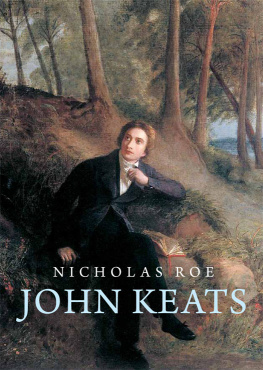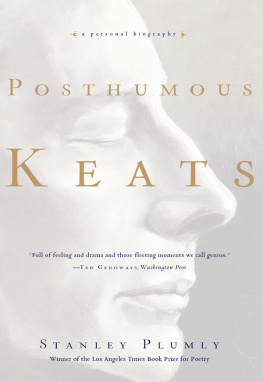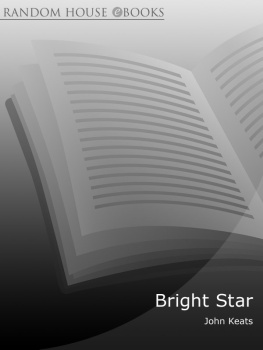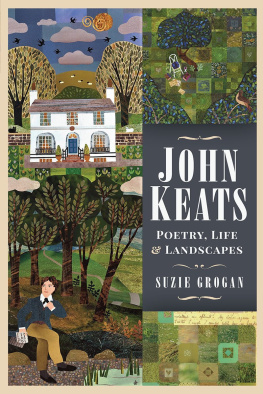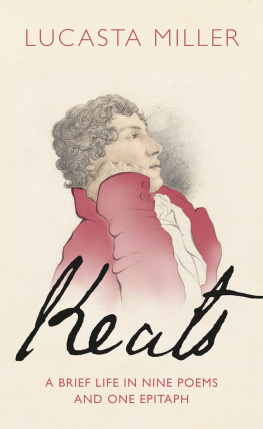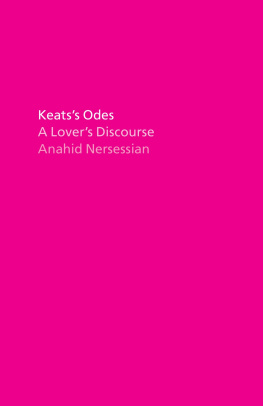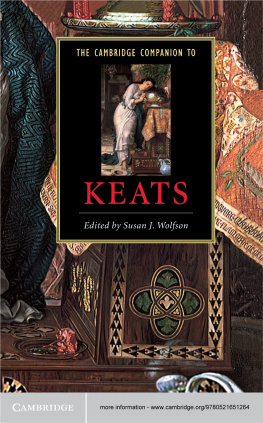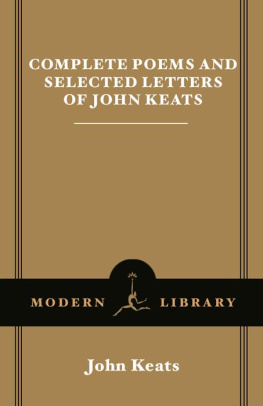KEATS, MODESTY AND MASTURBATION
Keats, Modesty and Masturbation
RACHEL SCHULKINS
Liverpool Hope University, UK
ASHGATE
Rachel Schulkins 2014
All rights reserved. No part of this publication may be reproduced, stored in a retrieval system or transmitted in any form or by any means, electronic, mechanical, photocopying, recording or otherwise without the prior permission of the publisher.
Rachel Schulkins has asserted her right under the Copyright, Designs and Patents Act, 1988, to be identified as the author of this work.
Published by
Ashgate Publishing Limited
Wey Court East
Union Road
Farnham
Surrey, GU9 7PT
England
Ashgate Publishing Company
110 Cherry Street
Suite 3-1
Burlington
VT 05401-3818
USA
www.ashgate.com
British Library Cataloguing in Publication Data
A catalogue record for this book is available from the British Library
The Library of Congress has cataloged the printed edition as follows:
Schulkins, Rachel, author.
Keats, Modesty and Masturbation / by Rachel Schulkins.
pages cm
Includes bibliographical references and index.
ISBN 978-1-4724-1879-1 (hardcover : alk. paper)ISBN 978-1-4724-1880-7 (ebook) ISBN 978-1-4724-1881-4 (epub)
1. Keats, John, 17951821Criticism and interpretation. 2. Modesty in literature. 3. Masturbation in literature. 4. Sex in literature. I. Title.
PR4837.S296 2014
821.7dc23
2013050295
ISBN 9781472418791 (hbk)
ISBN 9781472418807 (ebk PDF)
ISBN 9781472418814 (ebk ePUB)
Contents
Acknowledgements
Many contributed to the making of this manuscript, providing advice, help and support throughout. I would particularly like to thank Prof Kelvin Everest and Prof Marcus Walsh for their professional support and encouragement, and Dr Jon Roberts and Dr Jane Stabler for braving the first draft of this manuscript. I would also like to extend my gratitude to Dr Jill Rudd and Prof Paul Baines from the School of English, University of Liverpool.
I am extremely grateful for the financial support offered by the Jewish Widows and Aid Trust Award, whilst pursuing this project.
Most importantly, the pursuit of this research would not have been possible without the love and support of my family, who are and will always be a source of inspiration in every stage of my life. Dad, wherever you are, I know you are always there, encouraging and loving even from afar. I miss you!
To my husband, Joe, who always manages to put a smile on my face and a song in my heart, I just want to say, always and forever! Finally, completing this book coincided with a new and exciting stage in my life, becoming a mother to the wonderful Daniel Itzhak Schulkins my masterpiece.
Editions and Abbreviations
The edition of Keatss poetry used in this work is The Poems of John Keats. Ed. Jack Stillinger. London: Heinemann, 1978.
The quotes from Keatss letters omit Keatss deletions and are taken from The Letters of John Keats, 18141821. Ed. Hyder Edward Rollins. 2 vols. Cambridge Mass.: Harvard UP, 1958.
Individual Works |
C | The Keats Circle: Letters and Papers, and More Letters and Poems of the Keats Circle. Ed. Hyder Edward Rollins. 2nd ed. 2 vols. Cambridge Mass.: Harvard UP, 1965. |
LW | Conduct Literature for Women, 17701830. Ed. Pam Morris. 6 vols. London: Pickering & Chatto, 2005. |
L | The Letters of John Keats, 18141821. Ed. Hyder Edward Rollins. 2 vols. Cambridge Mass.: Harvard UP, 1958. |
WMW | The Works of Mary Wollstonecraft. Eds. Janet Todd and Marilyn Butler. 7 vols. London: William Pickering, 1989. |
Journals |
BHM | Bulletin of the History of Medicine |
EiC | Essays in Criticism: A Quarterly Journal of Literary Criticism |
ELH | Journal of English Literary History |
ERR | European Romantic Review |
JEGP | Journal of English and Germanic Philology |
KSJ | Keats-Shelley Journal |
KSR | Keats-Shelley Review |
NCL | Nineteenth-Century Literature |
N&Q | Notes and Queries |
PH | Paedagogica Historica |
PMLA | Publications of the Modern Language Association of America |
PQ | Philological Quarterly |
SEL | Studies in English Literature 15001900 |
SiR | Studies in Romanticism |
SP | Studies in Philology |
WC | The Wordsworth Circle |
Introduction:
Keats and the Masturbating Girl
The Edinburgh praises Jack Keats or Ketch or whatever his names are: why his is the Onanism of poetry something like the pleasures an Italian fiddler extracted out of being suspended daily by a Street Walker in Drury Lane this went on for some weeks at last the Girl went to get a pint of Gin met another, chatted too long and Cornelli was hanged outright before she returned. Such like is the trash they praise and such will be the end of the outstretched poesy of this miserable Self-polluter of the human Mind. (Byron, Byrons Letters and Journals 7: 217)
Mr. Keats whose poetry you enquire after appears to me what I have already said; such writing is a sort of mental masturbation he is always f-gg-g his imagination. (Byron, Byrons Letters and Journals 7: 225)
These attacks against Keatss 1820 volume of poetry, Lamia, Isabella, The Eve of St Agnes, and Other Poems, were voiced by Byron, and interestingly enough, they echo the same issues regarding class, gender and sexual impropriety raised a few years previously by Lockhart. Like the then celebrated Blackwoods critic, Byron launches an attack against Keatss sexual immaturity and want of sophistication. He dismisses Keatss 1820 volume as p-ss a bed poetry, a sort of mental masturbation, produced by Keats fggg his imagination (Byron, Byrons Letters and Journals 7: 200, 225). Byron is repelled, by what he terms, Keatss drivelling idiotism the Onanism of Poetry (Byron, Byrons Letters and Journals 7: 202, 217). For Byron, Keatss poetry is the product of an immature child playing with his quill his poetic phallus: It is, according to him, a mindless sensual titillation produced for the immediate gratification of the passing fancy. Byrons criticism is set to dismiss Keatss supposed tendency to employ his imagination for selfish pleasure, indulged and released through verse. Keatss poetry as such, according to Byron, is an expression of passion, a lyrical stimulation of desire and excitement exploded onto the page for personal gratification, be it poetic success or personal aspirations.
Byrons attacks render Keats as nothing more than an adolescent masturbator, an accusation supported by and based on Keatss effeminate style of writing. For many, Keatss poetry trespasses the conventional cultural construction of masculinity by embracing feminine qualities such as passivity, sentimentality and luxury. Writing in this manner prompted contemporary critics and poets such as Lockhart, Byron, Hazlitt and Leigh Hunt to brand Keats and his poetic style as effeminate. Lockhart, in his attack against Keats and the Cockney school, refers to Keats as good Johnny Keats, as the poet of prurient and vulgar lines, as a boy of pretty abilities, thus highlighting Keatss immaturity and effeminacy of style (
Next page

